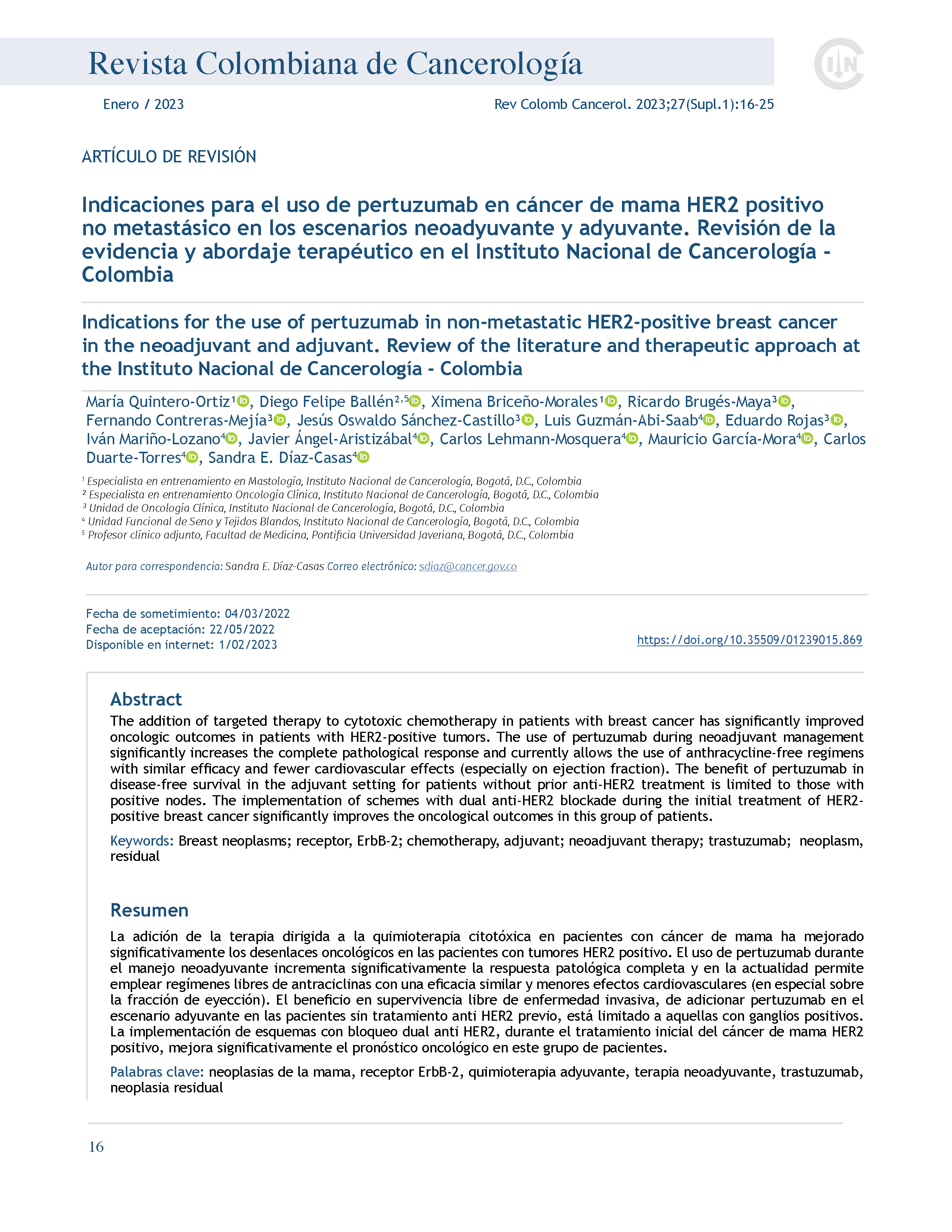Indications for the use of pertuzumab in non-metastatic HER2-positive breast cancer in the neoadjuvant and adjuvant. Review of the literature and therapeutic approach at the Instituto Nacional de Cancerología - Colombia
DOI:
https://doi.org/10.35509/01239015.869Keywords:
Breast neoplasms, receptor, ErbB-2, chemotherapy, adjuvant, neoadjuvant therapy, trastuzumab, neoplasm, residualAbstract
The addition of targeted therapy to cytotoxic chemotherapy in patients with breast cancer has significantly improved oncologic outcomes in patients with HER2-positive tumors. The use of pertuzumab during neoadjuvant management significantly increases the complete pathological response and currently allows the use of anthracycline-free regimens with similar efficacy and fewer cardiovascular effects (especially on ejection fraction). The benefit of pertuzumab in disease-free survival in the adjuvant setting for patients without prior anti-HER2 treatment is limited to those with positive nodes. The implementation of schemes with dual anti-HER2 blockade during the initial treatment of HER2-positive breast cancer significantly improves the oncological outcomes in this group of patients.
Author Biographies
María Quintero-Ortiz, Especialista en entrenamiento en Mastología, Instituto Nacional de Cancerología, Bogotá, D.C., Colombia.
1. Especialista en entrenamiento en Mastología, Instituto Nacional de Cancerología, Bogotá, D.C., Colombia.
Diego Felipe Ballén, Especialista en entrenamiento Oncología Clínica, Instituto Nacional de Cancerología, Bogotá, D.C., Colombia.
2. Especialista en entrenamiento Oncología Clínica, Instituto Nacional de Cancerología, Bogotá, D.C., Colombia.
5. Profesor clínico adjunto, Facultad de Medicina, Pontificia Universidad Javeriana, Bogotá, D.C., Colombia.
Ximena Briceño-Morales, Especialista en entrenamiento en Mastología, Instituto Nacional de Cancerología, Bogotá, D.C., Colombia.
1. Especialista en entrenamiento en Mastología, Instituto Nacional de Cancerología, Bogotá, D.C., Colombia.
Ricardo Brugés-Maya, Unidad de Oncología Clínica, Instituto Nacional de Cancerología, Bogotá, D.C., Colombia.
3. Unidad de Oncología Clínica, Instituto Nacional de Cancerología, Bogotá, D.C., Colombia.
Fernando Contreras-Mejía, Unidad de Oncología Clínica, Instituto Nacional de Cancerología, Bogotá, D.C., Colombia.
3. Unidad de Oncología Clínica, Instituto Nacional de Cancerología, Bogotá, D.C., Colombia.
Jesús Oswaldo Sánchez-Castillo, Unidad de Oncología Clínica, Instituto Nacional de Cancerología, Bogotá, D.C., Colombia.
3. Unidad de Oncología Clínica, Instituto Nacional de Cancerología, Bogotá, D.C., Colombia.
Luis Guzmán-Abi-Saab, Unidad Funcional de Seno y Tejidos Blandos, Instituto Nacional de Cancerología, Bogotá, D.C., Colombia.
4. Unidad Funcional de Seno y Tejidos Blandos, Instituto Nacional de Cancerología, Bogotá, D.C., Colombia.
Eduardo Rojas, Unidad de Oncología Clínica, Instituto Nacional de Cancerología, Bogotá, D.C., Colombia.
3. Unidad de Oncología Clínica, Instituto Nacional de Cancerología, Bogotá, D.C., Colombia.
Iván Mariño-Lozano, Unidad Funcional de Seno y Tejidos Blandos, Instituto Nacional de Cancerología, Bogotá, D.C., Colombia.
4. Unidad Funcional de Seno y Tejidos Blandos, Instituto Nacional de Cancerología, Bogotá, D.C., Colombia.
Javier Ángel-Aristizábal, Unidad Funcional de Seno y Tejidos Blandos, Instituto Nacional de Cancerología, Bogotá, D.C., Colombia.
4. Unidad Funcional de Seno y Tejidos Blandos, Instituto Nacional de Cancerología, Bogotá, D.C., Colombia.
Carlos Lehmann-Mosquera, Unidad Funcional de Seno y Tejidos Blandos, Instituto Nacional de Cancerología, Bogotá, D.C., Colombia.
4. Unidad Funcional de Seno y Tejidos Blandos, Instituto Nacional de Cancerología, Bogotá, D.C., Colombia.
Mauricio García-Mora, Unidad Funcional de Seno y Tejidos Blandos, Instituto Nacional de Cancerología, Bogotá, D.C., Colombia.
4. Unidad Funcional de Seno y Tejidos Blandos, Instituto Nacional de Cancerología, Bogotá, D.C., Colombia.
Carlos Duarte-Torres, Unidad Funcional de Seno y Tejidos Blandos, Instituto Nacional de Cancerología, Bogotá, D.C., Colombia.
4. Unidad Funcional de Seno y Tejidos Blandos, Instituto Nacional de Cancerología, Bogotá, D.C., Colombia.
Sandra E. Díaz-Casas, Unidad Funcional de Seno y Tejidos Blandos, Instituto Nacional de Cancerología, Bogotá, D.C., Colombia.
4. Unidad Funcional de Seno y Tejidos Blandos, Instituto Nacional de Cancerología, Bogotá, D.C., Colombia.
References
Díaz‐Casas SE, Castilla‐Tarra JA, Pena‐Torres E, Orozco‐Ospino M, Mendoza‐Diaz S, Nuñez‐Lemus M, et al. Pathological response to neoadjuvant chemotherapy and the molecular classification of locally advanced breast cancer in a Latin American cohort. Oncologist. 2019;24(12):1360–70. https://doi.org/10.1634/theoncologist.2019-0300
Piccart-Gebhart MJ, Procter M, Leyland-Jones B, Goldhirsch A, Untch M, Smith I, et al. Trastuzumab after adjuvant chemotherapy in HER2-positive breast cancer. N Engl J Med. 2005;353:1659-72. https://doi.org/10.1056/NEJMoa052306
Slamon D, Eiermann W, Robert N, Pienkowski T, Martin M, Press M, et al. Adjuvant trastuzumab in HER2-positive breast cancer. N Engl J Med. 2011;365(14):1273–83. https://doi.org/10.1056/NEJMoa0910383
Romond EH, Perez EA, Bryant J, Suman VJ, Geyer CE, Davidson NE, et al. Trastuzumab plus adjuvant chemotherapy for operable HER2-positive breast cancer. N Engl J Med. 2005;353(16):1673–84. https://doi.org/10.1056/NEJMoa052122
Perez EA, Romond EH, Suman VJ, Jeong JH, Sledge G, Geyer CE, et al. Trastuzumab plus adjuvant chemotherapy for human epidermal growth factor receptor 2 - Positive breast cancer: Planned joint analysis of overall survival from NSABP B-31 and NCCTG N9831. J Clin Oncol. 2014;32(33):3744–52. https://doi.org/10.1200/JCO.2014.55.5730
Meta-analysis of outcomes with the addition of adjuvant trastuzumab to chemotherapy for HER2-positive breast cancer - The ASCO Post. [cited 2021 Sep 1]. Available from: https://ascopost.com/news/august-2021/meta-analysisof-outcomes-with-the-addition-of-adjuvant-trastuzumabto-chemotherapy-for-her2-positive-breast-cancer/
Buzdar AU, Valero V, Ibrahim NK, Francis D, Broglio KR, Theriault RL, et al. Neoadjuvant therapy with paclitaxel followed by 5-fluorouracil, epirubicin, and cyclophosphamide chemotherapy and concurrent trastuzumab in human epidermal growth factor receptor 2-positive operable breast cancer: An update of the initial randomized study. Clin Cancer Res. 2007;13(1):228–33. https://doi.org/10.1158/1078-0432.CCR-06-1345
Gianni L, Eiermann W, Semiglazov V, Manikhas A, Lluch A, Tjulandin S, et al. Neoadjuvant chemotherapy with trastuzumab followed by adjuvant trastuzumab versus neoadjuvant chemotherapy alone, in patients with HER2-positive locally advanced breast cancer (the NOAH trial): A randomised controlled superiority trial with a parallel HER. Lancet. 2010;375(9712):377–84. https://doi.org/10.1016/S0140-6736(09)61964-4
Untch M, Fasching PA, Konecny GE, Hasmüller S, Lebeau A, Kreienberg R, et al. Pathologic complete response after neoadjuvant chemotherapy plus trastuzumab predicts favorable survival in human epidermal growth factor receptor 2-overexpressing breast cancer: Results from the TECHNO Trial of the AGO and GBG study groups. J Clin Oncol. 2011;29(25):3351-7. https://doi.org/10.1200/JCO.2010.31.4930
Earl HM, Hiller L, Vallier AL, Loi S, McAdam K, Hughes-Davies L, et al. 6 versus 12 months of adjuvant trastuzumab for HER2-positive early breast cancer (PERSEPHONE): 4-year disease-free survival results of a randomised phase 3 non-inferiority trial. Lancet. 2019;393(10191):2599-612. https://doi.org/10.1016/S0140-6736(19)30650-6
Van Der Voort A, Van Ramshorst MS, Van Werkhoven ED, Mandjes IA, Kemper I, Vulink AJ, et al. Three-year follow-up of neoadjuvant chemotherapy with or without anthracyclines in the presence of dual ERBB2 blockade in patients with ERBB2-positive breast cancer: A secondary analysis of the TRAIN-2 randomized, Phase 3 Trial. JAMA Oncol. 2021;1-7. https://doi.org/10.1001/jamaoncol.2021.1371
Gianni L, Pienkowski T, Im YH, Roman L, Tseng LM, Liu MC, et al. Efficacy and safety of neoadjuvant pertuzumab and trastuzumab in women with locally advanced, inflammatory, or early HER2-positive breast cancer (NeoSphere): A randomised multicentre, open-label, phase 2 trial. Lancet Oncol. 2012;13(1):25-32. https://doi.org/10.1016/S1470-2045(11)70336-9
Gianni L, Pienkowski T, Im YH, Tseng LM, Liu MC, Lluch A, et al. 5-year analysis of neoadjuvant pertuzumab and trastuzumab in patients with locally advanced, inflammatory, or early-stage HER2-positive breast cancer (NeoSphere): a multicentre, open-label, phase 2 randomised trial. Lancet Oncol. 2016;17(6):791-800. https://doi.org/10.1016/S1470-2045(16)00163-7
Swain SM, Ewer MS, Viale G, Delaloge S, Ferrero JM, Verrill M, et al. Pertuzumab, trastuzumab, and standard anthracycline- and taxane-based chemotherapy for the neoadjuvant treatment of patients with HER2-positive localized breast cancer (BERENICE): A phase II, open-label, multicenter, multinational cardiac safety study. Ann Oncol. 2018;29(3):646–53. https://doi.org/10.1093/annonc/mdx773
Schneeweiss A, Chia S, Hickish T, Harvey V, Eniu A, Hegg R, et al. Pertuzumab plus trastuzumab in combination with standard neoadjuvant anthracycline-containing and anthracycline-free chemotherapy regimens in patients with HER2-positive early breast cancer: A randomized phase II cardiac safety study (TRYPHAENA). Ann Oncol. 2013;24(9):2278-84. https://doi.org/10.1093/annonc/mdt182
Schneeweiss A, Chia S, Hickish T, Harvey V, Eniu A, Waldron-Lynch M, et al. Long-term efficacy analysis of the randomised, phase II TRYPHAENA cardiac safety study: Evaluating pertuzumab and trastuzumab plus standard neoadjuvant anthracycline-containing and anthracycline-free chemotherapy regimens in patients with HER2- positive. Eur J Cancer. 2018;89:27-35. https://doi.org/10.1016/j.ejca.2017.10.021
van Ramshorst MS, van der Voort A, van Werkhoven ED, Mandjes IA, Kemper I, Dezentjé VO, et al. Neoadjuvant chemotherapy with or without anthracyclines in the presence of dual HER2 blockade for HER2-positive breast cancer (TRAIN-2): a multicentre, open-label, randomised, phase 3 trial. Lancet Oncol. 2018;19(12):1630-40. https://doi.org/10.1016/S1470-2045(18)30570-9
von Minckwitz G, Procter M, de Azambuja E, Zardavas D, Benyunes M, Viale G, et al. Adjuvant pertuzumab and trastuzumab in early HER2-positive breast cancer. N Engl J Med. 2017;377(2):122-31. https://doi.org/10.1056/NEJMoa1703643
Piccart M, Procter M, Fumagalli D, de Azambuja E, Clark E, Ewer MS, et al. Adjuvant pertuzumab and trastuzumab in early HER2-positive breast cancer in the APHINITY Trial: 6 years’ follow-up. J Clin Oncol. 2021;39(13):1448-57. https://doi.org/10.1200/JCO.20.01204
How to Cite
Downloads

Downloads
Published
Issue
Section
License
Copyright (c) 2023 Revista Colombiana de Cancerología

This work is licensed under a Creative Commons Attribution-NonCommercial-NoDerivatives 4.0 International License.
Todos los derechos reservados.




